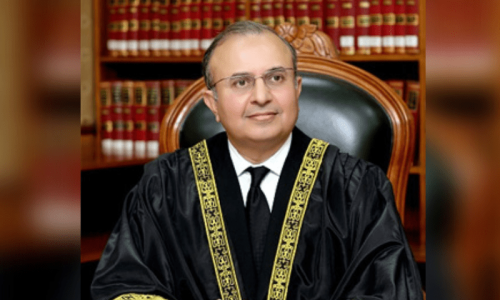JOHANNESBURG: The stench of human waste wafting through the gloomy lobby of a Johannesburg squat is unbearable, but resident Johannes Poto doesn’t seem to notice. Once he makes it past the litter in the lift shaft and up the battered staircase to his apartment, Poto enters a different world — one with family snapshots, florid prayer plaques and personal touches that might fit in anyone’s home.
Poto, 34, is among the poorest of Johannesburg’s poor who live for free in flats abandoned long ago by their owners and by utility companies who stopped supplying power and water.
Poto lives with his three children in the apartment, which has broken windows and no sewage system. Now, he fears things may be about to get much worse.
Like thousands of others who eke out a living in the inner city slums of South Africa’s commercial capital, he faces eviction and life on the streets under plans to revamp the crime-racked downtown area for the 2010 soccer World Cup.
“I was very frightened when the eviction notice came because I have nowhere to go,” said Poto, a petrol pump attendant who earns about 1,200 rand ($182) a month. “This place is a mess but it’s still my home and they haven’t offered me anything else.”
Human rights groups estimate 25,000 people could lose their homes due to planned evictions they say violate human rights, flout international law and reinforce apartheid-era segregation by pushing poor blacks out of the city.
“There is a kind of economic apartheid going on,” said Jean du Plessis, deputy director of the Geneva-based Centre on Housing Rights and Evictions (COHRE).
“The city needs to stop treating the poor like criminals and take stock of their desperation.”
Plagued by violent crime, drugs and prostitution, Johannesburg’s city centre became a no-go area for many South Africans after the demise of apartheid in 1994. Landlords like the owner of Poto’s building abandoned scores of apartment blocks. Water and power companies followed, leaving thousands living for free in unkempt buildings.
The council is slowly cleaning up the downtown area in an attempt to lure back businesses.
City officials hope that by the time the world’s gaze rests on Johannesburg for the 2010 World Cup, squats will have been replaced by upmarket loft apartments, smart delis and trendy boutiques.—Reuters










































Dear visitor, the comments section is undergoing an overhaul and will return soon.